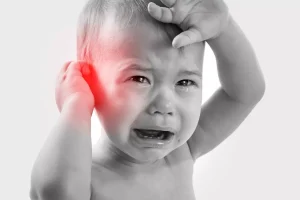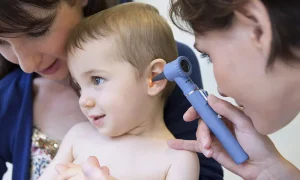
CHILDREN OTITIS MEDIA
Children otitis media. Acute otitis media, or ear infections, happen when bacteria or viruses infect the area behind your child’s eardrum. ear ache is one of the symptoms, which could make your baby or toddler more fussy or agitated. Ear infections often resolve on their own. Children occasionally require ear tubes, painkillers, or antibiotics.
CHILDREN OTITIS MEDIA
Acute otitis media, another name for an ear infection, is an unexpected infection of the middle ear. The air-filled area between your eardrum and inner ear. is called the middle ear. It contains the fragile bones that let you to hear by sending sound waves from your eardrum to your inner ear. Your middle ear and the back of your throat are connected by canals called eustachian tubes. They keep fluid from building up in your middle ear space and control the air pressure in your ear.
Signs

Ear infection symptoms frequently start after a cold. Among them is ear ache.
appetite loss.
difficulty falling asleep.
difficulty hearing in the obstructed ear.
a sensation of pressure or fullness in your ears.
Your ear may discharge a yellow, brown, or white substance. (This could indicate a ruptured eardrum.)
If you have ear drainage, avoid putting anything in your ear canal. More harm may result from an object coming into contact with a burst or torn eardrum.
Causes
Ear infections are caused by viruses and bacteria. Ear infections frequently start after an upper respiratory infection, such as a cold. The eustachian tube allows the germs to enter your middle ear. Once inside, the bacteria or virus may cause swelling in your eustachian tubes. Infected fluid in your inner ear and poor eustachian tube function can result from the swelling obstructing the tube.
Treatment

Treatment is contingent upon numerous circumstances, such as:
age of your child.
the infection’s severity.
the type of infection (repeated, continuous, or first-time).
How long does the fluid stay in the middle ear?
Ear infections frequently go away on their own. Before recommending therapies, your doctor might keep an eye on your child’s health to see if it gets better. If your child’s illnesses don’t go away, they can require surgery or antibiotics. Painkillers can assist with symptoms like ear ache in the meantime.
Antibiotics
If the ear infection is being caused by bacteria, your child may require antibiotics. Before administering antibiotics, medical professionals may wait up to three days to observe if a small illness goes away on its own. Your child may need to start taking antibiotics right away if the infection is severe.
Tympanostomy tubes, or ear tubes
If your child has recurrent ear infections, infections that don’t go away with antibiotics, or hearing loss from fluid accumulation, they might require ear tubes. During a tympanostomy, the tubes are positioned by an ENT specialist. The process takes only about ten minutes. That that day, your youngster can return home.
Prevention

Avoid colds and other respiratory conditions.
Prevent colds by being proactive, particularly in the first year of your child’s life. Instruct them to cough or sneeze into their elbow and to wash their hands frequently. Don’t let them share utensils, food, or glasses. Avoid big daycare centers till kids are older if at all possible.
Steer clear of secondhand smoking.
Stay away from secondhand smoke and don’t let other people smoke near your kids.
Give your infant breast milk. Breastfeed your child for the first six to twelve months of life, if at all possible. Breast milk contains antibodies that combat infection-causing germs and viruses.
Summary
If, after two to three days, your child’s symptoms of an ear infection don’t get better, call their pediatrician. Ear infections often resolve on their own. Your child may require antibiotics, depending on their age and symptoms.